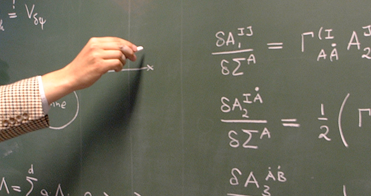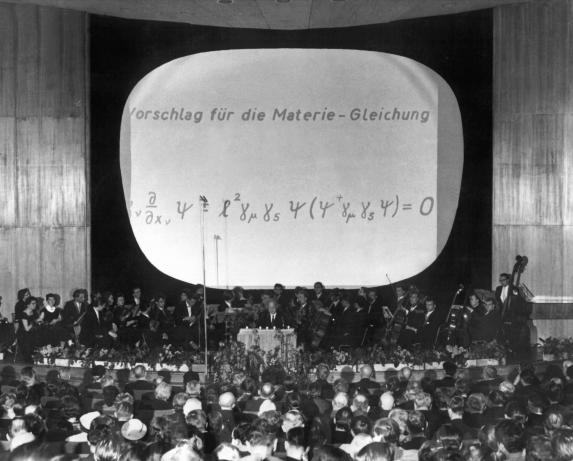New Joint Research Group on the History of Quantum Gravity at the Max Planck Institutes for the History of Science and for Gravitational Physics
- Feb 20, 2018
- Press Release
- Historical Epistemology of the Final Theory
- Alexander Blum
Dr. Alexander Blum (Max Planck Institute for the History of Science, MPIWG) has opened the new Max Planck Research Group “Historical Epistemology of the Final Theory Program” in collaboration with the Max Planck Institute for Gravitational Physics (Albert Einstein Institute; AEI) in February 2018. The new group works to bring together research in physics and history of science.

In search of a theory of quantum gravity. Image: Max Planck Institute for Gravitational Physics (Albert Einstein Institute; AEI).

Fig. 1: Werner Heisenberg presenting his "Weltformel" at the 1958 Planck Centenary in West Berlin. Source: DPA.
In 1916, Albert Einstein suggested for the first time that it would be necessary to merge his newly constructed general theory of relativity and the emerging quantum theory. 100 years later, this challenge remains unanswered, and the problem of constructing a theory of “quantum gravity” (as such a hypothetical merging came to be known) has become synonymous with physicists’ search for a final, fundamental theory.
“The Max Planck Research Group ‘Historical Epistemology of the Final Theory Program’ will reflect on and evaluate this century-long search using the methods of historical epistemology,” says Research Group Leader Alexander Blum. “Our research will deal both with the historically singular nature of the modern final theory program and with the strong opposition the program has encountered, mainly from within physics itself.“ It is the explicit aim of the group to conduct historical research that connects directly to contemporary physical research, providing a novel, historico-critical view of its status and prospects. To this end the group will be working in collaboration with Max Planck Institute for Gravitational Physics in Potsdam.
The Research Group follows a Max Planck Society (MPG) program funding early stage (post-PhD) scholars to independently develop a research program over five years, and is the first to bridge two disciplines.
Blum has a PhD in theoretical particle physics from the University of Heidelberg. His research interests lie in the history (and philosophy) of modern physics, with a strong emphasis on the postwar period. In 2010 he moved to the MPIWG, where he started out as a member of the Quantum History Project (until 2012). Since then he has been a Research Scholar at the MPIWG and coordinated the cooperative project with the Lindau Nobel Laureates Meeting Foundation.
Among his recent publications:
- Blum, Alexander. "The Literature Review as Imagined Past." Isis 108, no. 4 (2017): 827–829.
- Blum, Alexander, Martin Jähnert, Christoph Lehner, and Jürgen Renn. "Translation as heuristics: Heisenberg׳s turn to matrix mechanics." (2017).
- Blum, Alexander S. "The state is not abolished, it withers away: How quantum field theory became a theory of scattering." Stud. Hist. Philos. Mod. Phys. 60 (2017): 46–80.
- Blum, Alexander S., and Christian Joas. "From dressed electrons to quasiparticles: The emergence of emergent entities in quantum field theory." Studies in History and Philosophy of Science Part B: Studies in History and Philosophy of Modern Physics 53 (2016): 1–8.
- Blum, Alexander, and Thiago Hartz. "The 1957 quantum gravity meeting in Copenhagen: An analysis of Bryce S. DeWitt’s report." The European Physical Journal H 42, no. 2 (2017): 107–157.
